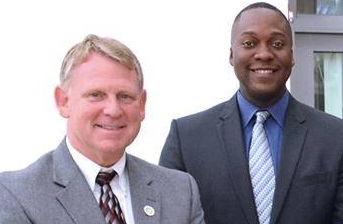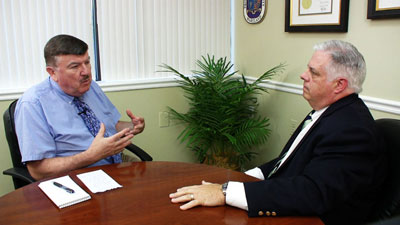Here are three commentaries on problems with the public financing of this year’s local elections in Howard County. The first is by County Council Member Deb Jung, an incumbent Democrat whose public funding is being held up. The second is a Jan. 20 official statement from Howard County Executive Calvin Ball, a Democrat who helped passed the law but whose administration is refusing to distribute the money until problems with the law are corrected. The third is the reaction of county Republican chair Stephen Wilson to Ball’s statement
Public funding under siege
By Deb Jung,
County Council, District 4 (West Columbia)
It was clear to me long before my first election four years ago that large campaign donations can play an outsized role in local government decision-making.
During this election cycle, following a public referendum in which 76,005 Howard Countians voted to establish a Citizens’ Election Fund (CEF), I chose to use that fundraising method to ensure that the citizens’ voice was paramount in our legislative process. Under the Citizens’ Election Fund rules, a candidate can only accept donations from individuals; no campaign donations can be accepted from PACs, corporations, LLCs, or unions. The point is to create a people-powered campaign.
Unfortunately, after the State Board of Elections fully qualified my campaign to receive a distribution on Jan. 4, the Calvin Ball administration, with no notice to my campaign before receiving email correspondence on Jan. 7, suddenly decided to withhold matching funds from all Citizens’ Election Fund (CEF) candidates until a legislative fix can be made regarding a technical issue in the CEF statute. With this decision, big money wins, special interests win, and voters lose.
At issue is the section in the Code that defines a contested election as one that occurs by the first Tuesday in August. This is approximately seven months before the Feb. 22 state filing deadline for primary candidates. Rarely, if ever, are there two declared candidates that early in the process. The first Monday in August is the state’s filing deadline for a general election third party or independent candidate; that is the purpose behind this date as testified to by the sponsor of the amendment, then-Council Member Jon Weinstein.
Obviously, this date has meaning but not for contested primary elections. To interpret this date as a way to block a CEF-qualifying primary candidate from deserved funds is more than just a literal interpretation, it is political maneuvering.
Importantly, the Howard County Citizens’ Election Commission, although informed of this problem in the law on Oct. 12, has never suggested that disbursements should be denied because of this technical issue. In fact, at the Commission’s meeting Jan. 10, they emphatically stated that the Director of Finance should release the disbursement and support emergency legislation to fix the issue legislatively.
Unless the bill passes as emergency legislation (CB6), the earliest a CEF disbursement could occur is April 10 because of the effective date requirements for legislation. This is almost halfway through the primary season and a serious impediment for a contested primary election such as my own and anyone else who would like to use the CEF for a primary race. At stake to date in my campaign is approximately $43,827 in state approved matching funds and another $2,875 still being processed, for a total of $46,702 matching funds requested so far.
[Editor’s note: Jung already has one filed Democratic primary opponent and another announced opponent who was an official the Ball administration.]
Withholding state-approved funds constitutes an unprecedented change of campaign finance rules in the middle of an election cycle. It creates a fundamentally unfair situation for CEF campaigns that have already formed public financing committees and will have a chilling effect on those who may be considering use of the CEF by the dtate candidacy filing deadline Feb. 22.
In my committee’s case, failure to disburse approved funds also creates financial uncertainty since, from a budgeting and contracting perspective, since we will not know when, if ever, funds will be released to pay for campaign expenses. To the contrary, disbursement of funds harms no one and the CEF program can proceed as represented by state and county officials. Unless the Howard County Director of Finance reconsiders his decision, the 76,005 Howard Countians who voted to amend the Howard County Charter to establish the Citizens’ Election Fund will have their expectations dashed that the people’s voice can outweigh big money’s choice.
Calvin Ball: I fought for public financing, put money into the fund and support efforts to clarify the law
By Calvin Ball
Howard County Executive
Throughout my career, I have been a demonstrated and steadfast supporter of publicly funded political campaigns. As a member of the County Council, I supported ballot question A, voted in favor of CB30-2017 which created the Citizens’ Election Fund, and voted to override the veto of then-County Executive Allan Kittleman.
As County Executive, I established the fund administratively in my first year in office, and have dedicated $1.25 million to the fund over our last two budgets, during uncertain fiscal times, when it would have been easy to allocate money elsewhere, to ensure the viability of the Citizens’ Election Fund for all County Executive and County Council candidates.
I am wholly supportive of any measure that clarifies the process through which the Citizens’ Election Fund program is administered that is done in a manner that is consistent with the intent of the legislation that created the fund. I fought to make this program a reality and will continue fighting to make it succeed.
Allan Kittleman, who vocally opposed Ballot Question A, vetoed CB30-2017, and refused to take any action to establish the fund for nearly 18 months after the Citizens’ Election Fund became law in Howard County, testified in support of a legislative fix to the administration of the Citizens’ Election Fund program on Tuesday night.
Was it only when Republican candidate Allan Kittleman saw an opportunity to benefit himself that his belief that “Our taxes should not go to boost the campaign coffers of any political candidate” subsided, and his efforts to “max out” the use of taxpayer funds to boost his own campaign coffers began?
I watched the Howard County Council public hearing, and the recounting of those who testified of continuing efforts in Montgomery County to fix issues related to the rules governing the fund through the legislative process.
I believe that we can do the same in Howard County, and look forward to working with our council to calmly make the adjustments needed to ensure the long-term success of the program. While we collectively wish we had been alerted of this issue sooner, I am pleased that we are now engaged in our legislative process and can resolve issues as they arise as has been accomplished in our peer jurisdictions that have successfully implemented the program.
GOP Chair: Ball is not playing by the rules and is possibly violating the law
By Steven H. Wilson
Chairman, Howard County Republican Central Committee
In case you missed it, County Executive Calvin Ball recently issued a “Statement regarding the Citizens Election Fund” on and for the official the Howard County Public website. That sounds reasonable—until you read it. His statement is a strong personal political attack on his opponent in the upcoming election— former County Executive Allan Kittleman.
This use of a county communications platform is both unethical and very probably a violation of campaign finance laws. But maybe Executive Ball plans, in the name of fairness, to offer Mr. Kittleman an opportunity to publish his response on the Howard County website. Even if he does, a government website is not the appropriate platform for such debate.
The Republican Central Committee cannot and does not favor one GOP candidate over another prior to the primary. Mr. Kittleman is currently running against Darren Vilus to be the Republican candidate for County Executive. The deadline for filing has not passed, and it is possible there will be more candidates in the race. We will not give preferential treatment. But we will call out violations of campaign ethics and misuse of county resources for personal gain, and we will correct misinformation about any party candidate.
In this case, it is incorrect of Dr. Ball to imply that candidates who did not support the Citizens’ Election Fund are ineligible to use it.
Ball claims that because Allan Kittleman campaigned against the 2016 referendum (Question A) which authorized the creation of the Citizens’ Election Fund and also vetoed the 2017 Public Financing bill (CB30), he must pretend that the law doesn’t exist.
This is nonsense. It’s like legislators who voted for a failed term limits bill being expected to leave office as if the legislation had actually passed. The point of such legislation is to change the system going forward. Term limits prevent people from using elected office as a career instead of the public service it was intended to be.
Public financing reduces the influence of deep-pocketed contributors. In any case, once legislation is passed, it is required that all elected officials be bound by it, and appropriate that they take advantage of any assistance it offers.
While in the Maryland State Senate, Mr. Kittleman supported and voted for HB 1499, the Campaign Finance Reform Act of 2013. That act enabled local jurisdictions to establish public campaign finance programs such as Howard County’s Citizens Election Fund (CEF).
His only reason for opposing CB30-2017 was his concern over the use of taxpayer revenue to fund the program. As he noted in his veto letter to the County Council dated June 13, 2017:
“I have always been in favor of public financing of elections, as long as donations are made voluntarily and not from taxpayer funds. For years, I have made these donations myself by checking off a box when filing my tax returns.”
He lost that policy dispute when the council overrode his veto, but it never changed his support for public campaign finance programs. And it does not make him ineligible to participate in the system.
Kittleman is using the program today, despite his concerns over funding, because it at least accomplishes its intended goal of reducing the influence of wealthy contributors. We, the Republican Central Committee of Howard County, ask Dr. Ball why he is not using the program—the very program he led the fight to create when he was County Council chairman? And why is he violating county communications policy by using the County website as his personal campaign apparatus?
Could it be that Dr. Ball plays by nobody’s rules but his own?







Recent Comments